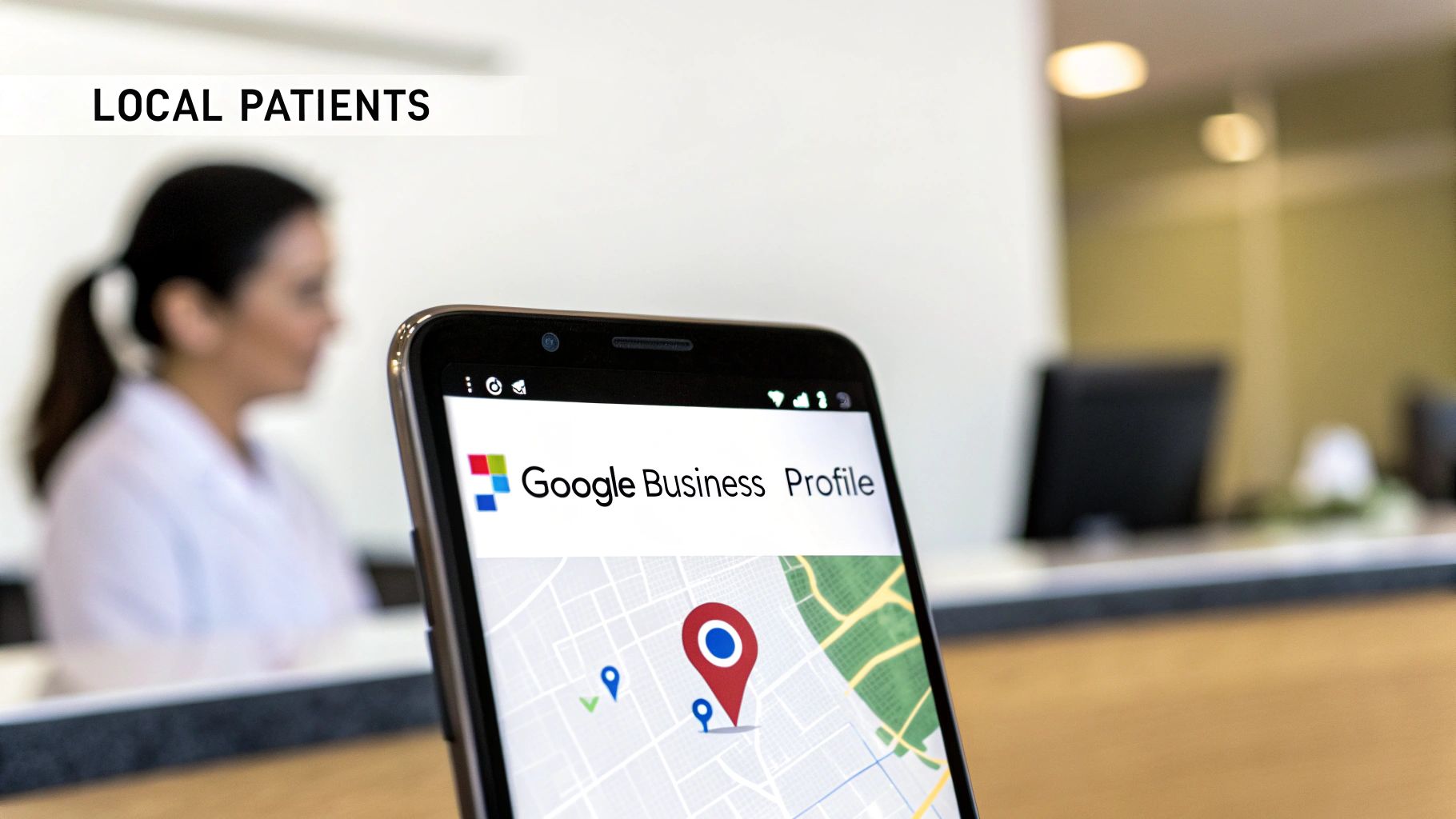Psychiatrist SEO is the process of making your practice visible online when a potential patient in your area searches for mental health care. It’s about being the first result they find at the exact moment they need help.
This guide breaks down exactly how to use SEO to connect with more patients, build trust, and grow your practice. Without a solid SEO plan, your practice is invisible to the people who need you the most.
Why SEO for Psychiatrists Is No Longer Optional
The days of relying on word-of-mouth referrals are over. Today, almost every patient's journey begins with a search engine.
When someone is struggling, they are far more likely to type "psychiatrist for anxiety near me" into Google than ask a friend for a recommendation. This simple change means your online presence is your most important tool for attracting new patients.
In Short: If potential patients can't find you on Google, your practice effectively doesn't exist to them.
The Modern Patient Journey Starts Online
Imagine a potential patient. They're dealing with stress, depression, or anxiety. Their first step is usually a private search on their phone or laptop.
They aren't just looking for any doctor. They are looking for answers and for someone who understands their specific situation.
When your website appears on the first page of search results, you instantly gain credibility. Your site becomes a source of professional information, making the first step of reaching out feel much less intimidating. For medical professionals, building a strong online presence that gets results is a fundamental part of running a successful practice.

The data clearly shows that your website and its visibility on Google are the primary ways you will connect with new patients.
What the Data Says
The numbers are clear about how people find mental health providers online.
| Statistic | Percentage/Number | What This Means for Your Practice |
|---|---|---|
| First-Page Preference | 92% | If you're not on the first page, you're invisible to almost all potential patients. |
| Online Info for Decision Making | 70% | Patients choose a psychiatrist based on your website and online profiles. |
| Website as Primary Interaction | 63% | Your website is the first "handshake." It's where patients learn about you and book appointments. |
These figures show that your search ranking directly impacts your ability to grow your practice.
Finding the Keywords Your Patients Use
Trying to rank for the single word "psychiatrist" is too competitive and brings in the wrong kind of traffic. The key to effective psychiatrist SEO is to target the specific phrases your ideal patients are typing into Google.
These longer, more detailed searches are called long-tail keywords, and they are incredibly valuable.
Think Like a Patient
Get inside the head of someone actively looking for help. What words would they use?
Here are some examples of high-value, long-tail keywords:
- Service + Location: "Child psychiatrist for ADHD in Miami"
- Insurance + Service: "Online psychiatrist that accepts Cigna"
- Problem + Treatment: "Best treatment for postpartum depression Dallas"
- Question-Based: "How do I find a good psychiatrist in my area?"
Searches like these show serious intent. The person is ready to book an appointment.
Free Tools to Start Your Research
You don't need expensive software to begin. Google itself is a powerful tool.
- Google Autocomplete: Start typing a phrase like "psychiatrist for…" into the search bar. The suggestions that appear are real searches from real people.
- "People Also Ask" (PAA): Search for a term, then scroll down to the "People Also Ask" box. This is a goldmine for content ideas because it shows the exact questions patients have.
For example, a search for "psychiatrist Miami" might show these PAA questions:
- How much does a psychiatrist cost in Florida?
- What is the difference between a psychologist and a psychiatrist?
- Do I need a referral to see a psychiatrist in Miami?
Each question is an opportunity to create content that builds trust.
Understanding Search Intent
It's also crucial to understand the user's goal.
- An informational search is something like "symptoms of anxiety."
- A transactional search is "anxiety treatment center Boston." They are ready to act.
Focusing on keywords with transactional or local intent brings more qualified leads to your practice. Chasing a broad term like "psychiatrist" is difficult. A specific phrase like "psychiatrist for ADHD in Los Angeles" has lower competition and a much better chance of landing on the first page.
In Short: Focus on specific, long-tail phrases that reflect the real needs of your ideal patients. This is the fastest way to attract people ready to book.
When you're ready for more data, tools like Google Keyword Planner can show you search volumes and competition levels. You can also check out our guide on how to use Google's Keyword Planner for more advanced tips.
Winning with Local SEO
Most of your patients live in your local area. This is why your Google Business Profile (GBP) is your most important marketing asset. It’s often the first thing a potential patient sees in local search results and on Google Maps.
When someone in your city searches "psychiatrist near me," Google aims to show the most relevant and trustworthy options. A well-managed GBP signals to Google that you are a legitimate and active practice. This helps you land in the "map pack"—the three local businesses that appear at the top of results.
Your GBP Is More Than a Listing
Simply claiming your profile isn't enough. Treat it as a dynamic part of your online presence. To make your psychiatrist SEO effective, you must actively manage it.
Your GBP is your control panel for how your practice appears across Google. You can update hours, reply to reviews, and upload photos to build trust. Consistent activity signals to Google and patients that you are engaged and open for business.
The Critical Role of Patient Reviews
Reviews are powerful social proof and a huge ranking factor for local SEO. A steady flow of positive reviews tells everyone—search engines and people—that you provide excellent care.
Asking for reviews in a mental health setting requires sensitivity.
- Pick Your Moment: The right time is often when a patient concludes a successful course of treatment.
- Keep it Simple: Send a follow-up email with a direct link to your GBP review page.
- No Pressure: Frame it as an invitation. Say something like, "If you feel comfortable, sharing your experience could help others."
In Short: Always respond to all reviews, good and bad. A thoughtful response to a negative review can build more trust than a page of five-star ratings because it shows you care.
Answering Questions in Advance
Your GBP has a Q&A feature that most competitors ignore. Use it to address common questions and concerns.
You can post and answer common questions yourself, such as:
- "Do you accept Aetna?"
- "What are your hours for new patients?"
- "Is there parking available?"
This saves your staff time and helps patients feel more informed and less anxious. A well-managed profile is a cornerstone of any strategy for local maps SEO.
Creating Content That Builds Trust
People looking for a psychiatrist are often in a vulnerable state. They need to trust you before they even call. Your website is where that trust begins.
This is about creating genuinely helpful, empathetic content that positions you as the expert in your community. An effective content strategy is what separates thriving practices from those that struggle online.

Go Beyond Generic Service Pages
A generic "Our Services" page is not enough. You need to speak directly to a person's specific struggle. Create dedicated, in-depth pages for the main conditions you treat.
- Depression Treatment: Explain your therapeutic approaches, what a first session looks like, and answer common questions about medication.
- PTSD & Trauma Therapy: If you specialize in EMDR, talk about it. Discuss your expertise and offer a clear path forward.
- ADHD Management: Detail your process for diagnosing and treating adults and children, as this is a common area of confusion.
Each page should be a rich resource. This is a powerful tactic, and you can learn more in our guide to marketing for doctors.
Answer Their Questions Before They Ask
The questions you hear from new patients repeatedly are content goldmines. Turning these FAQs into blog posts or a detailed FAQ page can ease patient anxiety.
In Short: Your blog should directly answer the exact questions and worries your ideal patients are typing into Google.
Here are a few questions that make great blog posts:
People Also Ask: Common Patient Questions
- What is the first step to seeing a psychiatrist? This is a great topic to demystify the process for new patients.
- How do I know if I need a psychiatrist or a therapist? Explaining the difference builds trust and helps patients make an informed choice.
- What should I not tell a psychiatrist? Addressing concerns about privacy and judgment head-on shows empathy and builds rapport.
Imagine how much less intimidating it would be for a nervous patient to schedule an appointment after reading a post titled, "What to Expect in Your First Psychiatry Appointment."
Writing With Empathy and Authority
Your tone is everything. You need to balance professional expertise with a warm, approachable voice. Avoid clinical jargon.
- Keep it simple: Explain complex topics in an easy-to-understand way.
- Focus on hope: Frame your content around positive outcomes.
- Show, don't just tell: Use anonymous case studies to illustrate how you've helped others (change all identifying details).
This approach connects with patients and aligns with Google’s E-E-A-T (Experience, Expertise, Authoritativeness, and Trustworthiness) guidelines. When you consistently publish helpful, expert-driven content, Google sees your site as a reliable source, which is a huge ranking factor.
Future-Proofing Your SEO for AI Search
The way people find information is changing. AI tools like Google's AI Overviews now answer questions directly on the results page.
Your website must be seen as the definitive, trustworthy source that these AI tools quote. The new goal is to be cited by an AI as the expert. This requires crystal-clear content and undeniable authority.

Make Your Content Easy for AI to Read
AI models scan websites quickly, looking for clear answers. A wall of text is a barrier. You have to write for scannability and clarity.
Use headings, subheadings, and bullet points as signposts.
In Short: Write for a busy person who is skimming, and you will naturally write in a way that AI loves.
For example, instead of a dense paragraph on anxiety treatment, use a simple list:
- Cognitive Behavioral Therapy (CBT): We help patients identify and reframe unhelpful thought patterns.
- Medication Management: We work with you to find the right medication and dosage.
- Mindfulness-Based Techniques: We teach practical skills to manage symptoms in daily life.
This format is easier for both patients and AI to understand.
Use Schema to Speak Google's Language
Schema markup is a special code you add to your website that explicitly tells search engines what each piece of content is about.
There are specific schema "types" for medical practices and physicians. Implementing this removes guesswork for Google. It helps AI tools confidently say, "Yes, this is a board-certified psychiatrist with this specialty and these hours." This clarity makes it more likely your information will be featured in AI answers. For more on this, check out these insights on building AI-ready medical sites.
Common Questions About SEO for Psychiatrists
Jumping into SEO can feel overwhelming. Here are answers to the most common questions from practice owners.
How long does SEO take to work?
SEO is a marathon, not a sprint. You should expect to see a significant impact within 6 to 12 months of consistent effort.
However, you will see encouraging signs much sooner, often within the first 3 to 4 months. These can include:
- More calls coming from your Google Business Profile.
- An increase in organic website traffic.
- Ranking for more specific, long-tail search terms.
Consistency is the most important factor. SEO rewards patient and steady effort.
If I can only focus on one thing, what should it be?
Local SEO. Pour your time and budget into dominating your local search results.
Your most valuable patients are searching for a "psychiatrist near me." This makes your Google Business Profile (GBP) your most powerful marketing tool. A complete, active, and well-reviewed GBP will drive more direct patient leads than almost any other single SEO tactic.
How much should I budget for SEO?
SEO costs vary based on your market and goals. Hiring a reputable agency typically costs between $1,500 and $5,000+ per month. This fee usually covers strategy, content creation, technical SEO, link building, and reporting.
If you handle SEO in-house, your biggest cost is your time, plus $100 to $300 a month for essential tools. Think of it as an investment in an asset that brings new patients to your practice for years to come.
Can I do SEO myself, or do I need to hire someone?
You can do more than you think. A hybrid approach often works best.
You can manage these key tasks yourself:
- Your Google Business Profile: Keep your information current.
- Patient Reviews: Set up a simple system to request feedback.
- Blog Posts: Answer your patients' most common questions in helpful articles.
The more technical side of SEO—like schema markup, site speed optimization, and link building—is complex and time-consuming. Many practices manage their content and GBP internally, then hire a professional to handle the heavy technical lifting and overall strategy.
At Clicks Geek, we build SEO strategies that connect psychiatrists with the patients who need their help. If you're ready to grow your practice and build a lasting online presence, we should talk. Learn more about our customized SEO solutions and schedule a consultation today!
Want More Leads for Your Business?
Most agencies chase clicks, impressions, and “traffic.” Clicks Geek builds lead systems. We uncover where prospects are dropping off, where your budget is being wasted, and which channels will actually produce ROI for your business, then we build and manage the strategy for you.






